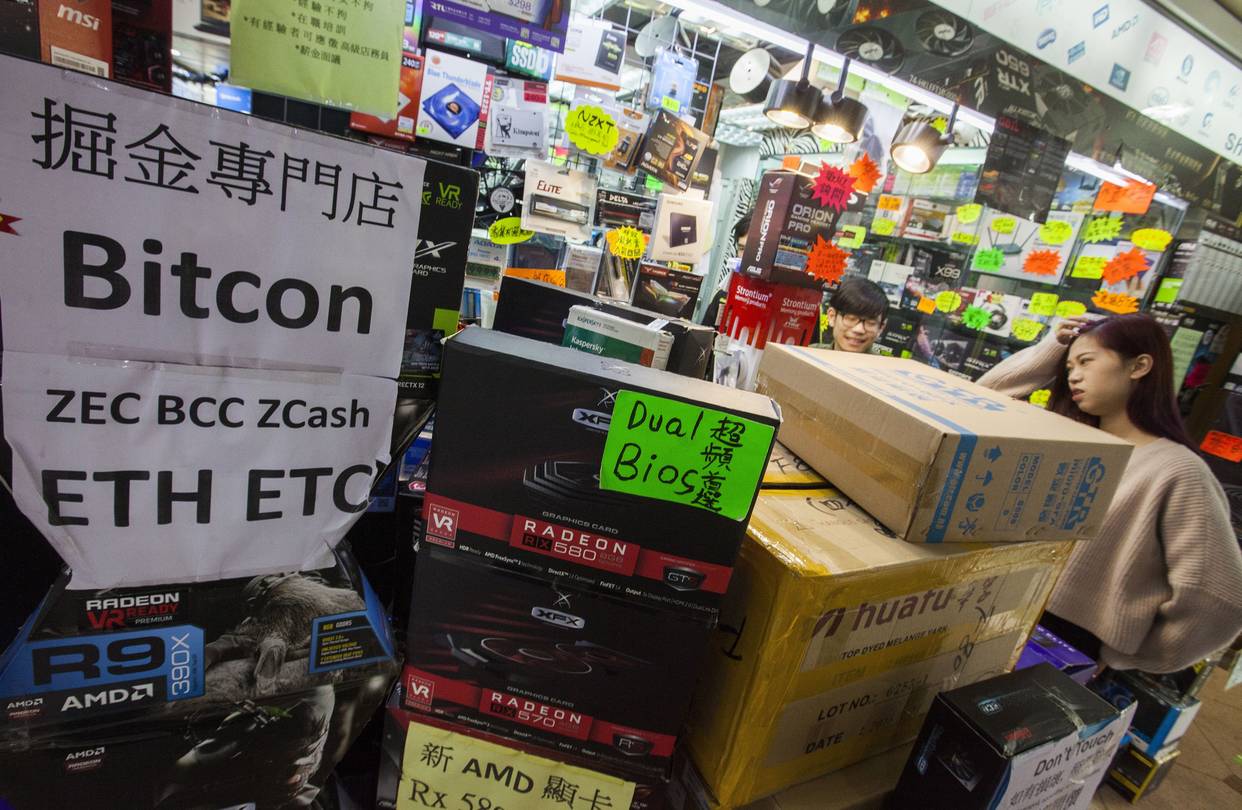
A technology trader advertises high-speed computers that can be used for cryptocurrency mining at the Golden Computer Centre in Hong Kong on Jan. 4, 2018
BEIJING—Bitcoin can’t catch a break in China.
Chinese authorities ordered the closing of operations that create a large share of the world’s supply of bitcoin, tightening a clampdown that has already shuttered exchanges for the trading of cryptocurrencies in China.
A multiagency government task force overseeing risks in Internet finance issued a notice last week ordering local authorities to “guide” the shutdown of operations that produce, or “mine,” cryptocurrencies, according to the notice and people familiar with the information.
While the notice called for an “orderly exit” without setting a deadline, far-flung areas of China where cryptocurrency mining operations have flourished are complying. A local regulatory official in the far western region Xinjiang said Wednesday that his agency received the notice and is doing “what the country wants.”
The central bank, the lead agency in the task force on Internet financial risk that issued the notice, didn’t respond to a request for comment.
Miners use powerful computer systems to solve complex math problems to generate and verify units of cryptocurrencies. The miners have thrived in sparsely populated areas of China where electricity is plentiful and inexpensive and temperatures are cooler.
Their winding down is the latest blow for bitcoin and other cryptocurrencies in what was a promising market but where the government is concerned about money laundering and risks in the financial system. China accounted for nearly 80% of computer power devoted to global bitcoin mining over the past 30 days, a rough approximation of its share of new units created in the same period, according to calculations based on data from ChainalysisInc., a New York-based research firm.
A loss of a large-scale mining operation would disrupt the creation and verification of cryptocurrency units, according to Philip Gradwell, chief economist at Chainalysis. He said it usually takes about 14 days for the bitcoin system to adjust before the rate of creating new coins stabilizes. If China were to wipe out 80% of global mining power in one go, recovery could take weeks, possibly months, he said.
“If China really does switch off all the minters suddenly, there could be a very high level of disruption,” Mr. Gradwell said. “It’s very hard to estimate back-of-the-envelope how big an impact would be.”
Such an across-the-board shutdown is unlikely, Mr. Gradwell and other analysts say, given that the Chinese government has been tightening the regulatory noose for months, prompting many operators to move their equipment elsewhere.
“I don’t think miners have been sitting on their hands,” said Arthur Hayes, who runs a peer-to-peer cryptocurrencies exchange called BitMEX. “Some people have already moved their hardware out of China.”
The founder of Chinese mining pool F2Pool, which accounts for 9% of the bitcoin mined over the past month, said his operations in Inner Mongolia and Xinjiang received “directives” from local authorities, though he declined to provide details.
“We are already very small,” said the founder, who is known in the Chinese bitcoin community by the nickname “Shen Yu,” or “mythical fish.”
After the government banned offerings of new cryptocurrencies and commercial exchanges in September, official scrutiny fell on the miners.
The government notice to shut down miners began circulating on social media last week and may have added to the factors that have seen prices of bitcoin drop to $14,200 from a high in December of $19,000 per unit after soaring for much of the year. Just before China’s clampdown in September, bitcoin traded for $4,600.
A potential shutting of China’s vast bitcoin mining network could also shake up the dynamics between global mining pools, or firms that share processing power, some analysts said. In recent years, a handful of these powerful Chinese pools resisted expanding the bitcoin network to process more transactions, according to cryptocurrency entrepreneurs.
If authorities in China have cooled to cryptocurrencies, demand has remained hot elsewhere, especially in South Korea, making that country the center of attention for the industry. South Korean regulators have announced tougher measures to crack down on cryptocurrency trading, following the collapse of one Seoul-based platform that investigators are looking into for possible involvement by North Korean hackers.
@OriginalWorks
Downvoting a post can decrease pending rewards and make it less visible. Common reasons:
Submit
The @OriginalWorks bot has determined this post by @smarifulislam to be original material and upvoted it!
To call @OriginalWorks, simply reply to any post with @originalworks or !originalworks in your message!
Downvoting a post can decrease pending rewards and make it less visible. Common reasons:
Submit
Hi! I am a robot. I just upvoted you! I found similar content that readers might be interested in:
http://www.theaustralian.com.au/business/markets/china-tightens-bitcoin-clampdown/news-story/2b2d95d2050975b4050b47ab4250ecce
Downvoting a post can decrease pending rewards and make it less visible. Common reasons:
Submit